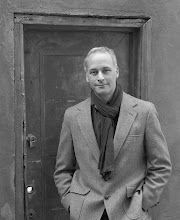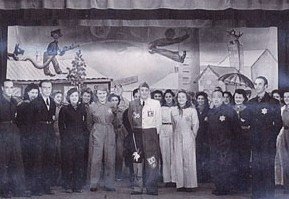 Chaja Goldstein performing as Yeshiva boy in 1933 ->
Chaja Goldstein performing as Yeshiva boy in 1933 -> "Chaja" by Paul Citroen
"Chaja" by Paul Citroen June and Paul Lowenberg contacted me last week because they recently found out that June's late aunt, Chaja Goldstein had been in Westerbork.
Goldstein is listed in the program for the first official Westerbork revue: Bunter Abend/Colorful Evening (July 1943)
http://www.max-ehrlich.org/bunter.htm
Goldstein was an all around performance artist who specialized in Yiddish songs and dances that were familiar to her childhood in Poland. One of her signature pieces was dressing as a Yeshiva boy to perform her numbers. In 1998 I interviewed Louis Dewijze,an other survivor who was in the Westerbork revues. He remembers Chaja as being famous to Jews throughout Europe for her Yiddish ditties.
Goldstein is also mentioned in some Westerbork accounts: Year of Fear by Phillip Mechanicus and Letters from Westerbork by Etty Hillesum. Both accounts recall Chaja performing in the revues and being invited to the Commandant's place for drinks with other celebs such as Camilla Spira.
She was not religious. June Lowenberg says that to her Orthodox family, Chaja's choice to become a dancer was initially met with shock and dismay.
"She was the original Beatnik" says Paul Lowenberg.
Chaja, who survived the war, spent most of her early life in Berlin. She moved to Holland and appeared in one of the first exile cabarets there, Cabaret Ping Pong, in 1933. According to Berlin Cabaret by Peter Jelavich, Ping Pong was closed down by the Dutch authorities for being too political so Chaja moved to Switzerland with other prominent Ping Pong performers like: Julia Marcus, Dora Gerson and Kurt Egon Wolff. They returned to Amsterdam the following year with a less political show that also included Dutch performers.
Chaja Performed around the world in the 30's. She was friends with and posed several times for the master portraitist, Paul Citroen as well as for Marc Chagall. June Lowenberg recalls that she was dancing in Bali and received a telegram not to return to Holland because the Nazis were going to invade. But assurances from her husband to the contrary convinced her to go back.
Chaja returned to Holland and eventually went into hiding.
"She got claustrophobic in hiding with all the people" says June, "And she went out."
Goldstein ended up in Westerbork where it is believed she stayed for the rest of the war.
Chaja's Husband, Theo Gusten, was a non-Jew and prominent German film maker.
Probably Goldstein's mixed marriage along with her celebrity status allowed her to survive. However it was required that she be sterilized.
Gusten also survived the war, but he was placed in several prisons by the Gestapo because he produced anti Nazi films. Gusten wrote a short account of his horrific experiences which the Lowenbergs are just starting to have translated. It tells of harrowing acts of defiance such as sharing news with other Inmates (punishable by death) and humming the "International."
After the war Chaja and her husband eventually moved to New York where they ran the International Graphics Art Society for many years. Eventually,they retired to Amsterdam.
Finally Chaja went to Israel to be near a surviving relative. But her yearly visits to her niece were very special.
June remembers that Chaja "exposed me to so much culture. We would go to museums and concerts. Once they went to see Marcel Marceau. Chaja was sometimes known as the Yiddish Mime.
"Every move she made, every gesture was always so theatrical."
June says that Chaja never talked about here experiences during the war. And she never performed again.
"Three weeks ago we didn't know any of this." says June.



